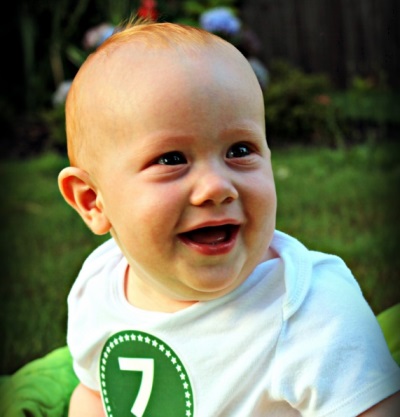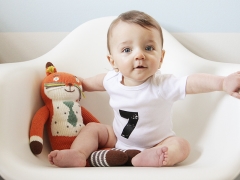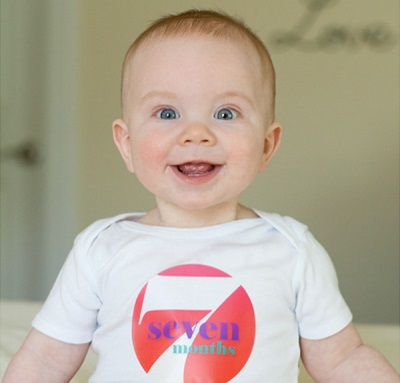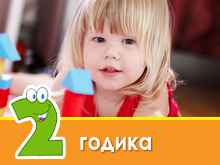Child development at 7 months
Parents of a seven-month-old child notice changes in the baby literally every day. This is not the helpless newborn that could only lie, sleep, eat and cry. By seven months, the baby has grown noticeably and is already a full member of the family. He communicates a lot, moves a lot, eats not only breast milk and constantly learns new skills. What did the baby learn by the age of seven months and how can parents stimulate the further development of the toddler?
Physiological changes
- The muscles of the child are becoming stronger, allowing the baby to keep the body in a sitting position at the age of 7 months and crawling, and also to stand, holding the support.
- The development of the right hemisphere is more intense, so the child can often use not his right hand, but his left, but this is not at all a sign that the child will be left-handed.
- The baby has 7 months already fully formed vision and hearing. The crumb turns even in response to a low sound and perfectly sees objects that move quickly.
- At the age of seven months, many babies have their first teeth cut. Some of the toddler's parents can notice only one of the lower incisors, and in some babies, two front lower teeth have already appeared and the upper ones are about to “hatch”.
- In connection with the introduction of complementary foods, the baby's chair changes - it becomes more rare (usually once a day) and thick, and its smell is sharper.
Physical development
Although the development of each baby takes place at its own pace, based on the performance of all children of a certain age, the limits of the norm have been defined, the excess of which both up and down is a reason to consult with a pediatrician. The main indicators for babies 7 months (both average and boundary) we collected in the table:
Indicator | Average of 7 months | Boys in 7-8 months | Girls at 7-8 months |
Weight | 7600-8300 g | 6700-10300 g | 6000-9800 g |
Growth | 67.3-69.2 cm | 64.8-73.5 cm | 62.7-71.9 cm |
Head circumference | 42.8-44 cm | 41.5-46.4 cm | 40.2-45.5 cm |
Chest circumference | 44.6-45.5 cm | 42.5-48.9 cm | 42.7-47.2 cm |
The seventh month of life brings the baby weight gain of about 600 grams, and height - from 1.5 to 2 centimeters. The circumference of the baby's head, as well as the circumference of the breast, becomes more than 0.5 cm. At the same time, we note that the chest circumference in healthy children of 7 months always exceeds the head circumference.
What baby can?
- Children of seven months are already great sit and crawl. However, some kids are already trying to sit on their own, but this skill is not yet available to the majority of karapuz. The seven-month-old babies crawl in different ways - someone moves on the tummy, someone manages to crawl back only, and someone gets up on all fours and moves quickly, rearranging the legs and arms.
- Many of the tops of this age can already stand, holding with both hands for a strong support. And some babies even step over their feet, making the first uncertain steps of the support. At the same time, the child has learned to get up, pulling himself up by the support, but he cannot sit back yet and is calling for his parents.
- A seven-month-old baby already holds various objects in his hands well, even if the toy has an irregular shape. A baby of this age can be engaged with toys for a long time. The kid reveals with interest their properties, closes and opens, throws, shifts, tastes and performs other actions.
- A seven-month baby is exploring new tastes, trying out complementary foods. The child has learned not only to eat from a spoon, but also to drink from a mug, let the cup itself help the adult hold it up for a while. But the baby at this age is already quite capable of holding the bottle on its own, and if it falls, it is able to lift it.
- The child understands the speech of parents. At the request of the baby can show some parts of the body and familiar objects that are in the same place. The child realized that the hidden object does not disappear forever, but is simply not visible. Also, the baby knows your name and the names of native people. Most babies are tied to their mother and may burst into tears from her absence.
- The babble of babies becomes more complicated, the crumb utters more and more syllables and many of them the baby pronounces in a meaningful way.

When determining whether a child is sufficiently developed at the age of seven months, parents should understand that each baby develops according to her personal schedule, but there are skills that the baby must definitely attend for 7 months.
The following points should be a reason for a visit to the pediatrician:
- Baby does not roll over.
- Do not sit alone.
- Does not examine objects using the mouth.
- Do not knock the toy on the table.
- Do not watch the moving toy.
- Does not pronounce syllables.
- Does not attract mom's attention and does not reveal emotions when communicating with mom.
Watch the following video of Larisa Sviridova on the development of the baby at 7 months. You will learn what is especially important for the psychological development of the crumbs.
Classes for development
Encourage crawling baby, because this stage of development is considered very important. Let the baby have comfortable clothes and the opportunity to try his hand on the floor. Help the crumbs, laying out your favorite toys and turning them into an achievable goal.
How to protect the crumbs in these important moments, see the transfer of E. Komarovsky.
- For the development of coordination, put the baby on the leg and shake, and dad can toss the baby up and down.
- Suggest a toddler pulling the "rope", taking a bright scarf for such a game.
- Hide the toy under the blanket in front of the child and have the baby find it. Also, the baby will enjoy watching small toys "hide" in the palm of your hand.
- Teach your child to point at the object being sounded with a finger, wave “bye” and clap their hands. Let's give the baby understandable tasks, for example, show a bear, open a box or take a spoon. Introduce the baby with the word "no", but it should apply only to real dangers.
- Turn on the baby music at different tempos, and you will notice that with slow melodies the child will calm down, and with a fast rhythm will begin to dance.
- Do not miss the opportunity to develop fine motor skills of the baby. For classes, you can use homemade bags with different fillings, finger paints, finger games ("goat horned", "forty-crow"), toys with buttons and much more that a child can feel, press, pull, touch and squeeze.
- Continue telling your child about everything you do to increase infant vocabulary. Call the toys that show the baby. Always call the baby by name, and also show photos of relatives, voicing their names.
- Walk with the baby, not only during the period when the baby needs to sleep, but also during wakefulness, to enable the baby to observe nature.
- You can use for classes with a tiny Doman card.
- Get baby baby books, which will be thick pages.Let the kid turn the page on his own and look at bright pictures, and you read poems at this time.
- Introduce your baby with other children, inviting them to visit or talking on walks. Let the children watch each other.
- When bathing, add a few toys to the bath that can swim.
From the video to SvitMam. tv you will learn why crawling is very important for the physical development of the child. Do exercises with your baby and enjoy his success.
.
Care
Every morning a 7-month-old baby begins with hygiene procedures. Crumbs are washed, cleaned if necessary nose and ears, trimmed marigolds, comb, brush teeth (even if they do not exist yet). The daily evening bath is already a habit and helps the baby to relax before a night’s rest.
The complex of gymnastic exercises at seven months is expanding. You can help your child stand up on his feet, bend and unbend the baby’s legs in the position on his back, turn the baby in different directions, hold his hand, do exercises for developing coordination and many others. In this gymnastics and massage is usually carried out in the morning.
As soon as the baby has learned to sit confidently, you can introduce the baby to the pot, but you do not need to feed special illusions about the speed of its development (the bladder and intestines are controlled by the children by 18 months and even later), as well as the child is forced to sit there for a long time. Let the baby be on the pot for up to 10 minutes, and it is best to choose the time after sleep for planting.
Daily regime
Children 7 months sleep about 15 hours a day, while some kids continue to sleep three times a day, and some tots have already switched to a two-day nap. The duration of a night's sleep is 9-10 hours, and daytime is about 5 hours. With a 3-time sleep option in the afternoon, as a rule, one of the rest periods is longer, and the other two are shorter (up to an hour).
Walking with a 7-month-old baby is recommended twice a day for 2 hours. Only under adverse weather conditions such as heavy rain, severe frost or wind, can you stay with the little ones at home. In warm summer weather, the baby can spend up to 6 hours daily on the street. You can plan a walk for daytime baby dreams or so that the child is awake for a while outside.
Meals of a seven-month-old baby include 5 meals, between which it takes from 3 and a half to 4 hours. The amount of food a child needs 7 months a day is calculated based on the weight of the baby. The body mass of the baby should be divided by 8. The resulting amount of food is divided by the number of feedings. On average, a child of seven months eats 1000-1100 ml of food per day. A serving per meal is approximately 200-220 ml.
When breastfeeding the child is applied to the breast about 7-10 times during the day and 2 to 4 times at night (usually in the morning). Breastfed babies at seven months of age receive food groups such as vegetables, cereals and fruits. Begin to enter into the diet of vegetable oil, adding it to the puree of vegetables. The menu of babies-ismostennikov expands due to the appearance in it of cottage cheese, fruit juice, yolk, cookies and crackers. Read more in the article about baby menu at 7 months.
Typical day
Every day with a seven-month baby is entertaining and interesting. Of course, each infant's regime will be individual for 7 months, but in order to imagine what the day regimen of a child of this age can look like, we offer the following example:
7: 00 | Spilling. The first feeding, in which the baby receives breast milk or formula. Hygiene procedures. Wakefulness |
9: 30 | Gymnastics. |
10: 30 | The second feeding, in which children breastfed are given gruel, and crumbs-artificials add butter to it. Period of wakefulness. |
12: 00 | Walk, during which the crumbs have the first daytime sleep in the fresh air. |
14: 00 | Homecoming. The third feeding, during which the kids, regardless of the type of feeding, get vegetable puree with vegetable oil, but fruit juice and yolk are added to the artificial children. |
15: 00 | The period of wakefulness and educational games. |
16: 00 | Walk, during which the child has a second day's sleep in the fresh air. |
18: 00 | Homecoming The fourth feeding, which in breastfed babies include fruit puree and breast milk, and in bottle-fed babies, cottage cheese, fruit puree, cookies and a mixture. Wakefulness |
21: 00 | Bathing. The fifth feeding, during which the baby receives breast milk or formula. Laying down on a night's sleep. |
Night time | Breastfeeding babies in a dream are applied to the breast several times, children-artificialis most often do not wake up for feeding. |
An ordinary day with a child, you can vary the tonic massage. Technique of execution, see the next video of Nikolai Nikonov - the leading doctor and massage therapist in Russia.
Frequent problems
- Fear of strangers. Seven-month-old children already clearly distinguish between familiar people and strangers, and may react negatively to a stranger. So do not leave the baby alone with any stranger to him. Wanting to acquaint the baby with someone, stay close, take the baby in your arms and hold it until the baby is comfortable with the situation and understand that the stranger is not dangerous.
- Problems falling asleep and sleeping. Many tots due to increased physical activity during the day begin to sleep worse at night, and laying down the baby becomes problematic. In laying you will help create a ritual. Daily with the child the same actions before going to bed, which will set up the baby for a night rest.
- Refusal of prikorma. Many children, especially those who had previously eaten only mother's milk, refuse unfamiliar products, not wanting to taste mashed potatoes or liquid porridge lovingly prepared by mom. Forcing a child to try a new food is unacceptable. Do not insist, give the child a breast, and eventually offer a new dish again. If the child flatly refuses to mash and porridge, think about the possibility of introducing pedagogical feeding.
- Pain and discomfort during teething. Children react to the appearance of teeth in different ways. In some babies, parents learn about the tooth only after peeking into the mouth, but in many babies, the appearance of each tooth is accompanied by increased drooling, redness of the gums and their swelling. Often, the child's temperature rises and the stool may be disturbed. Cooled teethers, anesthetic gels, antipyretic drugs help cope with the discomfort.
The main thing a baby needs is the love of its parents. Spend time interesting and enjoy the joint activities. Play with the child, based on the lessons on the method of O. Teplyakova - an expert in intellectual development.






































